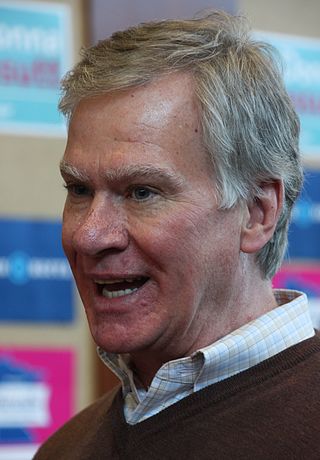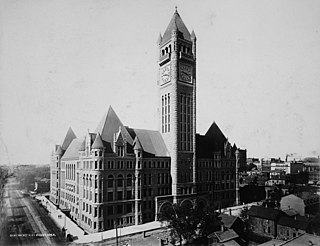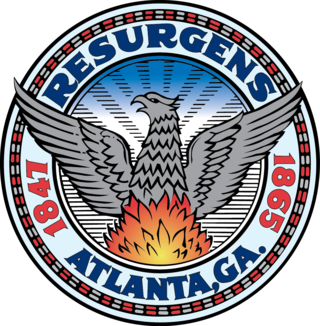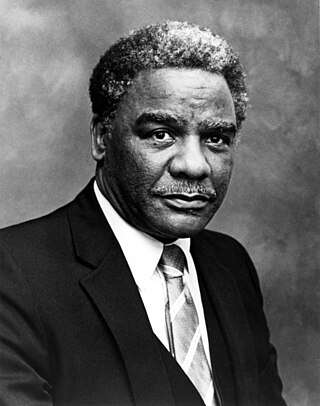
Norman Bertram Coleman Jr. is an American politician, attorney, and lobbyist. From 2003 to 2009, he served as a United States Senator for Minnesota. From 1994 to 2002, he was mayor of Saint Paul, Minnesota. First elected as a member of the Democratic–Farmer–Labor Party (DFL), Coleman became a Republican in 1996. Elected to the Senate in 2002, he was narrowly defeated in his 2008 reelection bid. As of 2024, he is the most recent Republican to have represented Minnesota in the U.S. Senate.
The government of the U.S. state of Ohio consists of the executive, judicial, and legislative branches. Its basic structure is set forth in the Constitution and law of Ohio.

The Mayor of the City of Hoboken is the head of the executive branch of government of Hoboken, New Jersey, United States. The mayor has the duty to enforce the municipal charter and ordinances; prepare the annual budget; appoint deputy mayors, department heads, and aides; and approve or veto ordinances passed by the City Council. The mayor is popularly elected in a nonpartisan general election. The office is held for a four-year term without term limits.
The Optional Municipal Charter Law or Faulkner Act provides New Jersey municipalities with a variety of models of local government. This legislation is called the Faulkner Act in honor of the late Bayard H. Faulkner, former mayor of Montclair, New Jersey and chairman of the Commission on Municipal Government.

Christopher B. Coleman is an American politician and lawyer who served as the 54th Mayor of Saint Paul, Minnesota between 2006 and 2018. He defeated incumbent mayor Randy Kelly in 2005 and took office on January 3, 2006. He was later succeeded by city councilman Melvin Carter on January 2, 2018.

The Mayor of the City of Jersey City is the head of the executive branch of the government of Jersey City, New Jersey, United States. The mayor has the duty to enforce the municipal charter and ordinances; prepare the annual budget; appoint deputy mayors, department heads, and aides; and approve or veto ordinances passed by the City Council. The mayor is popularly elected in a nonpartisan general election. The office is held for a four-year term without term limits, although the current term is a four-and-a-half-year term, due to a change in election dates.

The government of Detroit, Michigan is run by a mayor, the nine-member Detroit City Council, the eleven-member Board of Police Commissioners, and a clerk. All of these officers are elected on a nonpartisan ballot, with the exception of four of the police commissioners, who are appointed by the mayor. Detroit has a "strong mayoral" system, with the mayor approving departmental appointments. The council approves budgets, but the mayor is not obligated to adhere to any earmarking. The city clerk supervises elections and is formally charged with the maintenance of municipal records. City ordinances and substantially large contracts must be approved by the council.
The Government of Denver makes up the public sector of the City and County of Denver, Colorado.

Minnesota is known for a politically active citizenry, with populism being a longstanding force among the state's political parties. Minnesota has consistently high voter turnout; in the 2008 U.S. presidential election, 77.8% of eligible Minnesotans voted – the highest percentage of any U.S. state or territory – versus the national average of 61.7%. This was due in part to its same day voter registration laws; previously unregistered voters can register on election day, at their polls, with evidence of residency.

The government of the City and County of San Francisco utilizes the "strong mayor" form of mayoral/council government, composed of the Mayor, Board of Supervisors, several elected officers, and numerous other entities. It is the only consolidated city-county in California, and one of only thirteen charter counties of California. The fiscal year 2019–20 city and county budget was approximately $12.3 billion.

Minneapolis, the largest city in Minnesota and the county seat of Hennepin County, operates under a Mayor–council government system. This article provides an overview of the structure and functions of Minneapolis's city government, focusing on the city council, mayoral office, and other key elements of local governance.
The Government of Pasadena, Texas operates under a Mayor-Council form of government with a mayor and eight council members who are responsible for enacting legislation, adopting budgets and setting policies.

The Atlanta City Council is the main municipal legislative body for the city of Atlanta, Georgia, United States. It consists of 16 members: the council president, twelve members elected from districts within the city, and three members representing at-large posts. The city council is the legislative branch of the Atlanta city government.

The Harrisburg City Council is the legislative branch of the city government of Harrisburg, Pennsylvania and consists of seven members elected at-large. The council president is elected by the council members and presides over city council meetings. In the event of illness or absence of the president, the vice president presides over the meetings. Each member's term is four years, serving part-time. There are no limits on the number of terms a member may serve.

The government of the City of Los Angeles operates as a charter city under the charter of the City of Los Angeles. The elected government is composed of the Los Angeles City Council with 15 city council districts and the mayor of Los Angeles, which operate under a mayor–council government, as well as several other elective offices. Under the California Constitution, all judicial, school, county, and city offices, including those of chartered cities, are nonpartisan. The current mayor is Karen Bass, the current city attorney is Hydee Feldstein Soto and the current city controller is Kenneth Mejia.
The government of Albuquerque is the government of Albuquerque, New Mexico as defined by its charter. The city has a mayor-council government, divided into an executive branch headed by the Mayor and the nine-member City Council which holds the legislative authority.

The Whatcom County Council, the legislative body of Whatcom County, Washington, consists of seven members, five elected by district and two elected at large. The Council adopts laws, sets policy, and holds final approval over the budget.

Lydia Marie Edwards is an American attorney and politician. She served as a member of the Boston City Council from the 1st district from 2018 to 2022 and has served as a member of the Massachusetts Senate from the 1st Suffolk and Middlesex district since 2022. She resigned from the Boston City Council at the end of April 2022.

The veto power in Illinois exists in the state government as well as many municipal and some county governments. The gubernatorial veto power is established in the Illinois Constitution, and is one of the most comprehensive vetoes in the United States. It began as a suspensive veto exercised jointly with the Supreme Court but has grown stronger in each of the state's four constitutions. The gubernatorial veto power consists of two vetoes that apply to all bills passed by the General Assembly and two vetoes that apply only to appropriations measures.















